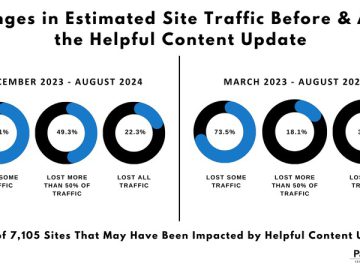Generative AI and other advancements present new challenges and opportunities, says Chris Attewell at Search Laboratory. It’s time to re-invest in SEO.
SEO has rapidly evolved over the last 18 months. At one point, marketers even thought SEO was on its way to becoming extinct, leaving businesses with a considerable operational and monetary gap to fill. Thankfully, SEO isn’t dying, and brands can still thrive organically, but marketers aren’t out of the woods yet.
However, not understanding or solving challenges such as generative AI appearing on search engines, effectively tracking multichannel user journeys, and decoding the impact of recent Google updates will leave businesses with real visibility and revenue ramifications compared to their competitors.
There are, thankfully, innovative solutions marketers can utilize to ensure their brand stays ahead of the competition. These result in a future-proofed SEO strategy that enhances team productivity, increases business revenue, and leads to unlimited growth potential in the organic search landscape.
Want to go deeper? Ask The Drum
Gen AI for business efficiency
The most significant change in SEO has undoubtedly been the introduction of generative AI. Although generative AI has only existed for a few years, businesses are already harnessing its power to enhance SEO productivity.
ChatGPT can drastically speed up ideation, reducing the time teams spend thinking up content ideas. Generative AI allows SEO teams to devote more resources to molding enhanced SEO strategies that deliver more toward overall business goals.
Regarding getting ahead of the competition, generative AI’s inclusion in search engines makes it even easier for organizations’ content to be seen in search engine results. This revelation means users’ queries are answered almost instantaneously on search engine response pages (SERPs), giving brands an extra opportunity to get ahead of competitors.
What needs remembering, though, is that users who do this are less likely to click traditional search result links and visit company or product pages. So, although efficiency and visibility are enhanced, SEO is still as competitive as ever. Every brand is still vying to get seen first and grab those vital sales.
New platforms
Every platform, from YouTube to Reddit to Instagram to TikTok, can now form a step in the search journey. This is exciting because it means an SEO and social media strategy can be morphed more closely together, aligning KPIs and business goals.
On the other hand, creating content that resonates with users and optimizes on multiple platforms, so that potential and actual revenue aren’t lost to competitors, is an incredibly difficult challenge for marketers.
Plus, multichannel search means users can purchase an item without visiting the website up to the point of sale. While this opens new revenue streams, tracking these journeys so marketers can understand the most profitable channels for their business is a complex puzzle to solve.
Backlinks have always been critical for brands as they contribute heavily to SEO authority, relevancy, and visibility, leading to increased sessions and sales. However, questions were raised when news spread that several senior Google figures felt backlinks were no longer an essential ranking factor for SEO.
For brands that have built up strong authority over several years through methods such as digital PR, the news that these links may soon be obsolete is a massive worry for marketers.
Although many marketing experts denounced Google’s comments, it still begs the question: What metrics matter to search engines, and from that, how do brands capitalize on their historical momentum to drive conversions and sales?
Future proof
So, after outlining the three challenges affecting SEO now and in the near future, how should marketers respond to these challenges?
First, strong technical SEO must still be at the forefront of all businesses’ minds. For users, getting from point A to point B as smoothly as possible leads to a more enjoyable experience and (more importantly) increases conversions.
Not fixing on-site fundamentals can also significantly damage a brand’s path toward online growth and visibility on generative AI platforms integrated into search engines.
Updating SEO analytics is another remedy for future-proofing SEO strategies. Resetting SEO KPIs to clearly resonate across all business goals is vital to understanding your brand and competitors. Not doing so means marketers miss assessing AI and multichannel search’s impact on overall company success.
Furthermore, marketers ensuring content is as platform-proof as possible helps organizations connect with users throughout multichannel journeys. Tying SEO and organic social media strategies together enables companies to see a more holistic view of organic performance.
Finally, as noted earlier, utilizing AI to support content creation, reporting, and ranking success will increase productivity and, most importantly, revenue as businesses evolve their SEO strategy for the future.
Suggested newsletters for you
Daily Briefing
Daily
Catch up on the most important stories of the day, curated by our editorial team.
Ads of the Week
Wednesday
See the best ads of the last week – all in one place.
The Drum Insider
Once a month
Learn how to pitch to our editors and get published on The Drum.




